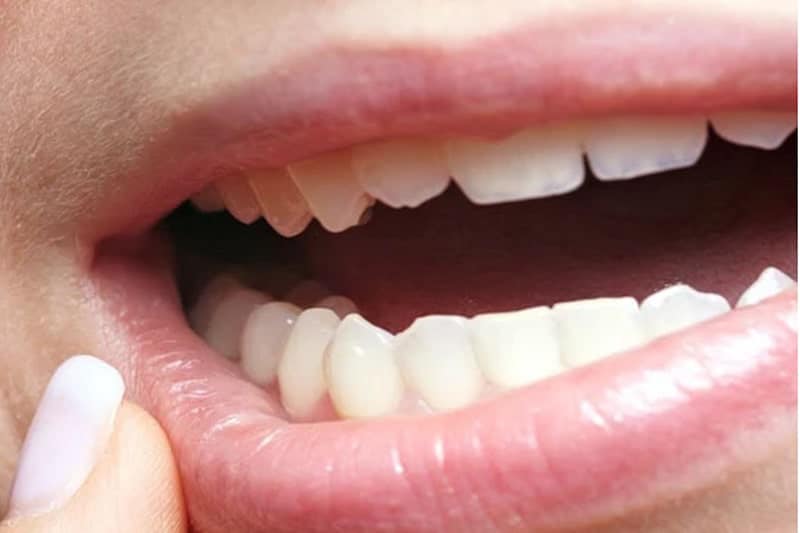A cold, an infection or a cavity? There are several reasons why painful teeth occur. As a dental practice in League City, we list some of the most common reasons.
Receding Gums
When the gums recede, the root surfaces of the teeth are exposed. Since they have no enamel, they become very sensitive and the risk of cavities is increased. The sensitivity is especially noticeable when eating or drinking hot, cold, sweet or sour foods. Brushing your teeth twice a day and using floss, toothpicks or interdental brushes can generally help alleviate the symptoms. If symptoms are not too severe, a special toothpaste for sensitive teeth may be effective. It leaves a thin protective film on the sensitive parts of the teeth. The dentist can also make a plastic bit that you fill with this toothpaste and slide it over your teeth. This increases the exposure time and thus the effect. In addition, daily rinsing with a neutral mouthwash containing fluoride or applying fluoride varnish at the dentist can help. However, because of wear and tear, this treatment will need to be repeated regularly. If the problem is severe, the dentist may apply a filler, such as composite, to the exposed necks.
Inflamed gums
Are the gums red and swollen and do they bleed occasionally? Then it is inflamed. It may be gingivitis (first stage) or periodontitis (more advanced). Sometimes, but not always, it causes pain. Gum inflammation is serious business, because bacteria and the toxins they produce can travel through the bloodstream all over the body. As a result, they can even cause cardiovascular disease (among other things). For this reason, you should always have gingivitis treated by an oral hygienist or periodontist. Afterwards, it’s important to keep your teeth clean.
Colds
When you have a cold, the cavities become blocked and the pain can radiate to your teeth. With this type of pain, it is not felt in just one tooth, but in the entire set of teeth. As soon as the cavities become less blocked, the pain subsides.
Grinding or clenching
Many people grind their teeth at night without being aware of it. This can cause problems during the day. It can cause painful teeth, headaches, stiff jaws and muscle aches. Clenching of the jaws causes the same symptoms. Depending on the cause, the dentist can offer various solutions. These include physiotherapy, psychotherapy (if the symptoms are anxiety or stress related, for example) or by fitting a plastic bit. Such a bite should be worn while sleeping to protect the teeth.
A cavity
Cavities (caries) are the most common cause of toothache. They are caused by the bacteria in plaque. In the early stages of a cavity, there is pain when eating or drinking something sweet, cold or warm. Over time, this turns into a continuous and nagging pain. A dentist can bring relief by drilling and filling the hole. Untreated cavities can eventually affect the nerve of the tooth. In the worst case, the nerve may have to be removed with root canal treatment.
An abscess
If you experience pain when chewing or when pressing on a tooth, you may have an abscess, which is a buildup of pus under the gums. It may be caused by a late treatment of a cavity or gingivitis. Bacteria can then cause an infection in the soft part of the gums. Since the pus cannot escape, an abscess develops. If the inflammation is severe, the cheek or neck may swell. An abscess can cause mild pain or even excruciating pain. Treatment is chosen depending on the location and extent of the infection. An initial or small abscess, for example, can be treated with a course of antibiotics. Sometimes a thorough cleaning under the gums is necessary. If the abscess is large, the dentist will make a small incision in the gums to allow the pus to escape. Or perform a root canal treatment.
Root tip inflammation
Root tip inflammation can be caused by a small hole that allows bacteria to enter the tooth. It is also possible that some ‘debris’ may be left behind during root canal treatment. Root point infections do not go away on their own and can have serious consequences for the surrounding teeth. It is therefore important to have it treated. Under anaesthetic, the dentist will drill a small hole to the root tip and remove the infection. The root is then closed with a filling.
Broken tooth
A broken tooth can cause a lot of pain. If left untreated, it can cause long-term damage. Therefore, it is important to see your dentist in League City as soon as possible and to treat the problem as soon as possible.
Wisdom teeth erupt
Not everyone’s wisdom teeth erupt at a young age. This can also happen later in life, causing problems. For example, there may be too little space in the jawbone for a wisdom tooth to grow partially or completely under the gums. There is then a risk that bacteria will remain under the gums, causing the gums or jawbone around the wisdom tooth to become infected. Also, because of their position at the back of the teeth, wisdom teeth can be difficult to keep clean, causing tooth decay.
In case of complaints, it is always advisable to call our dental office in League City, Texas. We are happy to help you over the phone or in person.

